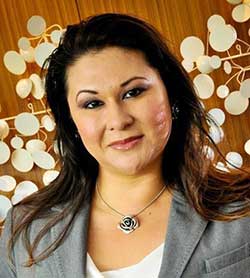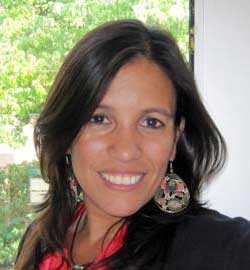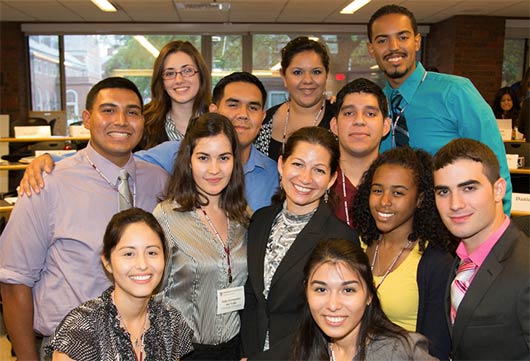
Editor’s Note: The following article is one in a series presented in honor of Hispanic Heritage Month and designed to help parents prepare to send their kids off to college, brought to you by Colgate.
What’s it like to be the first person in your family to attend college? For many Latino first generation college students, the hopes, dreams and sacrifices of their entire family seem to be riding on their shoulders. Here, three Latinas share their stories of being members of “Generation 1st.”
“I HAD ALL THESE FACES LOOKING UP AT ME TO SUCCEED.”
Byrdie, 33, is a Marketing and Social Media consultant and a director with LATISM. Born in the border-town of Eagle Pass, Texas, Byrdie was intrigued early on by the idea of going to college. “I remember seeing a commercial when I was around eight years old, during a novela break,” she says. In the ad, a young female college student sat reading on the campus of the University of The Incarnate Word. “I recall turning to my mom and asking her, ‘Mom, what is that place?’ She said, ‘It’s college. It’s where you go when you are older and finish school.’ I told her ‘Okay, I think I’ll go there.’ Nine years later, I did.”
Read Related: Top 10 Reasons Why Latinos Need to Go to College

Byrdie
Byrdie applied to the University of The Incarnate Word and was accepted (“I didn’t even apply anywhere else. I knew that’s where I would go,” she says). With her acceptance and early graduation from high school as a junior, Byrdie was on her way to making family history—and serving as a role model to younger family members. “I’m the oldest female cousin on my mother’s side, so as I got closer to graduation and college, I suddenly had all these little faces literally looking up at me to succeed,” she says. “To do this thing that no one in our family had done before.”
Byrdie’s parents were both hard workers; her mother was born in Texas, first generation, and began working at the age of twelve, and her Mexican-born father explained to Byrdie that “he went to school enough to learn the basics and the rest he figured out in life.” Coming home from college on breaks to visit her family, Byrdie felt what it was like to be creating a new chapter in her family’s story. “The hugs felt different. The food tasted different,” she recalls. “Things were changing and not just because I was growing up, but now looking back, I can see it was the fact that I was trailblazing this new history within the family.”
So how did college help Byrdie get to where she is today? “College teaches you how to teach yourself,” she explains. “I am pretty good at teaching myself these days or at least figuring out what it takes to get from point A to point B.” Byrdie, who also went to grad school, advises kids who are debating on whether or not to go to college to at least give it a shot. “Being a student is like having home court advantage,” she says. “There are doors that will open for you that won’t otherwise like internships, field trips (to your dream job company for example).” Byrdie suggests finding a mentor who can help steer you in the right direction. (If you don’t have one, tweet her @ByrdieFranco!)

Angie
“NEVER GIVE UP ON YOUR DREAM!”
Angie was never sure about what levels of education her parents had completed, but she was fairly certain they hadn’t attended college and that she was the first in her family to do so. Her mother and father both moved to the U.S. from Colombia; Angie’s mother worked as a hotel maid and her father passed away when Angie was only 8. It was only as an adult that Angie discovered that her parents had attended schools in Colombia. “My father did graduate college in Colombia. He was an accountant. My mom went to secretarial school,” Angie says. “They came here to the U.S., but their degrees did not count since they did not speak the language.”
Armed with this new knowledge of her parents’ dreams and struggles, Angie realizes now that she was her family’s first U.S. college grad, and sees the significance this had for her mother. “When I finally graduated, my mother was very proud,” she remembers. “I was the first in my family to graduate from an American university.”
Now 41 and a World Languages and Cultures Specialist, Angie found inspiration and motivation in her mother’s struggles. “I wanted to live a better life,” she says. “My mom worked as a hotel maid and had trouble understanding her bills, which were in English, and usually needed me to communicate to customer service representatives and translate bills and other mail.” Language is a theme that is woven into Angie’s family history; her double major in college was French and Public Relations, and her education is continuing. “[I] am pursuing a second Master’s in Special Education Leadership,” she says, adding that “obtaining a degree is not an easy task for anyone, but it is even more challenging when you are a child of immigrants with so many hardships.”
Angie has three children of her own, and she makes sure to communicate the value of a college education to them. “They see the importance of school and take it seriously,” she says. Equally important is the tenacity to persevere and obtain a degree despite the challenges you may face. “Never give up on school,” says Angie. “Do what you love. Love what you do. Be versatile. Try new things. Be flexible.”
“NOT GOING TO COLLEGE WOULD HAVE MADE THEIR SACRIFICES IN VAIN.”
Shelley’s parents instilled the importance of education in their daughter very early on. “They saved up their money and got me an encyclopedia set when I was born,” says Shelley, 34, a commercial still and motion photographer and video producer in New York. Born to Puerto Rican parents who met at a factory in Manhattan’s Lower East Side, Shelley saw firsthand how hard her mother and father worked to make a life for their family. “Sometimes during the summer, [my mother] would take me to the factory where she worked,” Shelley recalls. “I napped on a thin foam mattress dressed in scrap fabric. She explained all the work she did for less than minimum wage. She got sick often—rashes from the fabric, congestion from the chemicals.” Shelley’s father also suffered from punishing work. “My dad couldn’t close his right hand from the callouses he developed working. He had to file it down at night to be able to work the next day.” Shelley believed that honoring their wishes and attending college was the right path, and the only path. “I had no excuse,” she says. “Not going to college would have made their sacrifices in vain.”
The values Shelley’s parents instilled in her paid off; Shelley did extremely well in school growing up, which translated into multiple options when it came to selecting a college. “I got into every private university I applied to, many with the offer of a full scholarship,” she says. “I had always been in gifted programs and specialized schools.” But her college experience wasn’t easy. Shelley pushed her parents to allow her to live in a dorm, but “there were not a lot of Latinos at the dorms,” she says. “A few months in, I experienced a racially-biased incident that was just the start of a lot of harassment from students and corrupt staff.” Shelley transferred to a different school, but switching schools meant saying goodbye to her full scholarship and its resources. “[I] had to pay for the school myself… quite a financial blow after having a free ride,” she laments.
Despite these challenges, Shelley saw her college experience through, and it helped her to pave her own way when it came to creating a future for herself. At NYC’s New School, Shelley explains that “although I got a degree in Liberal Arts, because the school was so progressive I was able to take classes in advertising, marketing, media, art and filmmaking, which positioned me to start my own creative services firm as I was finishing up on my degree.”
Shelley is passing on her parents’ belief in the power of education to her own 9-year-old son. “I tell him that school in general is important because it opens the doors for us to eventually do what we love, and life is all about that.” Born in a rough neighborhood, Shelley also sees the college experience in another light: “College, I think, is partially about what we learn, partially a right of passage into adulthood, and ultimately what breaks us out of the ‘caste’ we may have been born into.”












